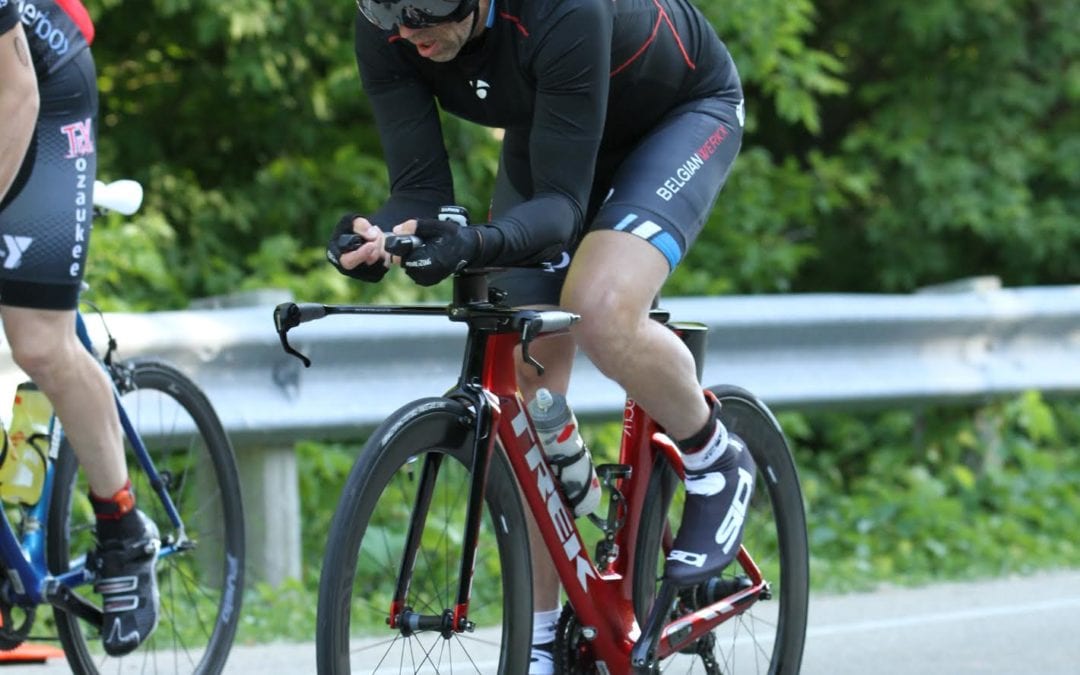We were able to talk with Rob McDougall, of the Extreme Endurance team this week, and we asked
him some questions about being an endurance athlete and about his competitions.
What are his favorite events?
Rob started off as a runner and weightlifter. After tearing his rotator cuff and experiencing many injuries, he switched to cycling. For the last 5-6 years, he has been focusing on competing in road races, time trials, and triathlon relays. He hopes to compete in High Cliff Relay, RiverEdge 100 mile ride, the Wisconsin Milkman triathlon, and the Random Lake Triathlon this season.
How long has he been competing?
Rob has been competing in events for a long time, initially starting as a distance runner, completing marathons, half marathons, 5K, and 10K races. He gradually transitioned over to cycling, where he participated in 100 mile rides and 40K time trials.
What are his goals for the 2017 season?
2016 was a good year for Rob. Unfortunately, due to an illness that sidelined him in February 2017, Rob’s training is currently behind schedule. His current goal is to average 27.3 mph at this year’s 40 Km time trials.
What challenges has he faced?
Age plays a large factor in Rob’s training and racing. He requires more discipline when training. His active rest days truly require rest, whereas when he was younger, his training didn’t need to be as strict. Rob joined the Extreme Endurance team 4 years ago and found that he enjoyed the time trials but was not properly equipped to truly compete in them. However, with the right equipment, his confidence has grown, and he has achieved better results in each successive year at the time trials.
How has therapy helped him succeed?
Rob acknowledges that he has been fairly injury prone. As a result, he has been to therapy several times, and he has worked with a number of therapists. Rob has worked with Mike Karegeannes, Mike Verplancke, and Spencer Tredo. He believes that his body was not built to run marathons, and he experienced many challenges in the course of his running career as a result. Rob acknowledges that therapy has enabled him to recover from his injuries and to continue to train for his next event, overcome tough challenges, and to keep finishing his races.
What inspirational words does he have for other athletes?
The biggest advice Rob can give is to get connected with your teammates. The training that occurs during the off season determines how well you will race when summer comes around. Working with his teammates allows him to remain motivated, causes his competitive nature to come out, pushes him further, and encourages him to work his hardest.
How does he use therapy to maximize his athletic performance?
Rob utilizes physical therapy to help him discover if he can work through his symptoms or if he needs to seek further diagnostic testing and assessment. Having been injury prone in the past and having had everything from IT band tightness, calf strains, achilles tendonitis, and many other injuries, it has been difficult to decide when to push through the pain. Rob believes that 90% of the time people can work through the symptoms, and physical therapy helps them get through their problem areas. Therapy gives them confidence that pain and injury will go away if they stay true to their therapy routine. After all, therapy helps to promote healing and allows people to continue engaging in activities without damaging themselves.
What are the top 3 training mistakes to avoid?
- Be cognizant of your age when setting your training schedule. You can’t go 100% at every training event because you need more active rest days. You need to be disciplined on your rest days because your body won’t recover if you workout too many days in a row, and your performance will suffer.
- Carry decent insurance. Consult a physical therapist early on so injuries don’t worsen. Too often, if you ignore an injury, it will eventually cause you to lose significant training time. If the injury or problem is assessed quickly, then the chances are better that it will not get worse.
- Winter or indoor training is imperative. You need solid training during the winter to truly get you ready for the race season.
What does he look for in selecting a physical therapist?
Since Rob is very busy, he looks for a physical therapy clinic that has flexible availability. He prefers Freedom Physical Therapy Services because he is confident that all of their therapists are well trained, and he feels comfortable seeing them. Even if his regular therapist is not available, Rob knows that he will still receive excellent care.

